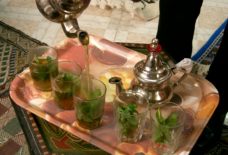From the Upper West Side to the Middle East: Najla Said on Her New Memoir, Looking for Palestine
“I am a Palestinian-Lebanese-American Christian woman, but I grew up as a Jew in New York City. I began my life, however, as a WASP,” writes author and actress Najla Said, whose new memoir, Looking for Palestine: Growing Up Confused in an Arab-American Family (Riverhead), sorts through a bewildering stew of identities with honesty and humor. Said grew up in the 1980s on the Upper West Side, eating bagels from Zabar’s and surrounded by intellectuals; she attended school across Central Park on the Upper East Side, at sea amid the blonde daughters of privilege. While her father and “temperamental soul mate,” the scholar Edward Said, was arguing for Palestinian self-determination (and her Lebanese mother, Mariam, was managing their daily life), young Najla was gripped by an eating disorder, struggling to reconcile TV news stereotypes of the Middle East with her own eye-opening experiences—including visits to her father’s homeland, where she toured refugee camps in an Agnès B. skirt—and to her mother’s family in Beirut, where she found a sense of belonging. Vogue corresponded with Said about her own path to self-definition, both onstage and on the page.
Your memoir shows so clearly how the fear of being different, something so dreaded by children, can be a tremendous advantage as an adult. We bring other perspectives into the room; we have more than one country to call home. That said, identifying as Arab-American has only become more complex since you were a child. Did writing the book help you clarify what it means to you?
It did. I think that for so long I really wanted to find out if I was more “Arab” or more “American,” as if there was some definitive answer to that question, since “Arab-American” never seemed to feel as though it fit properly. In writing the book, I was able to really dive into the questions I had about my so-called “real identity” and ultimately understand that they were probably never going to be resolved. In an interesting way, that is also what I felt connected me to my father’s work and his legacy. He was a person who hated labels and saw himself as a true exile from all sorts of cultural identifications.
As I went through the experiences of my childhood, I began to see how I had come to absorb all he believed in and thought about without even trying. That was a wonderful realization: I had somehow created and thought incessantly about my own mixed-up “identity” precisely because I was never encouraged to embrace just one. I feel totally American at times and totally not American at times, and I feel the same way about being Arab.
Your memoir emerged from your successful one-woman show, Palestine, which struck a chord in post 9/11 New York. What made you decide to adapt that into a book in the first place, and what was the process like? Have any responses to it surprised you?
I wrote the play to give myself an acting job—and because I was encouraged by colleagues who felt it would be an important story to tell, and a way to add to the creative contributions of the newly visible (post-9/11) Arab-American community. I was frustrated, as I had been constantly auditioning to play Arab women in film and TV and onstage, only to find that I come across as far more “white” because of my skin tone (Hollywood Arabs tend to most often be dark-skinned; real Arabs, of course, are completely varied) and my education and upbringing. And yet I rarely got to audition for anything other than “the Arab.” I wanted to write a play that showed all the sides of my personality and range. And then, when I started performing Palestine, I was overwhelmed with positive responses to my writing. Literary people saw me perform and encouraged me to turn it into a book. I started working on that as soon as the show closed in 2010.
I will say this: It was extremely difficult to write a book, in prose, in my own voice, without being able to rely on my acting skills to convey subtext. I’m surprised when people like my writing; I am not surprised when some people are disappointed that it doesn’t sound like something my father wrote. That happens all the time, and it doesn’t even faze me anymore.
There have been a number of prominent memoirs by the children of famous author fathers published in the last year, but in Looking for Palestine, your mother is just as strong a presence. What was her reaction to the book?
It’s amazing that just being the daughter of someone, and being from a particular culture and not hiding it, makes you automatically “political” or “controversial.” In fact I only really started to know my mom after my dad died. He was so larger-than-life, it was hard for anyone to see how incredible she was. As a grown-up, and as a woman, I am so proud of who she is, and in a sense I wanted to write it for her. My mom is not the most demonstrative person in the world, which is why, when she opened it and saw that it was dedicated to “my parents,” and she smiled and got sort of flushed with pride, I felt that even if everyone else hated the book, I made my mother proud.
Megan O’Grady
Vogue



